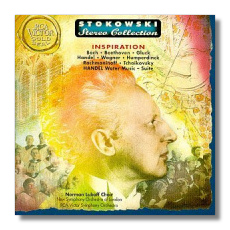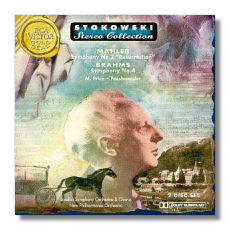
The Internet's Premier Classical Music Source
Related Links
- Latest Reviews
- More Reviews
-
By Composer
-
Collections
DVD & Blu-ray
Books
Concert Reviews
Articles/Interviews
Software
Audio
Search Amazon
Recommended Links
Site News
 CD Review
CD Review
Leopold Stokowski Stereo Collection

Inspiration
- Ludwig van Beethoven: Song, Op. 48 #4, Die Ehre Gottes aus der Natur
- Traditional: Deep River
- Engelbert Humperdinck: Hansel und Gretel: Abends will ich schlafen gehn "Evening Hymn"
- Johann Sebastian Bach:
- Herz und Mund und Tat und Leben, BWV 147: Jesu bleibet meine Freude
- Was mir behagt, ist nur die muntre Jagd, BWV 208 "Hunt Cantata": Schafe konnen sicher weiden
- Sergei Rachmaninoff: Song, Op. 34 #14, Vocalise
- Anonymous: Old Hundredth
- Richard Wagner: Tannhäuser: Begluckt darf nun dich "Pilgrims' Chorus"
- Piotr Ilyitch Tchaikovsky: Sacred piece for mixed Chorus #6, Our father
- Christoph Willibald Gluck: Orfeo ed Euridice: Dance of the Blessed Spirits
- George Frideric Handel:
- Serse, HWV 40: Ombra mai fù "Largo"
- Water Music Suite #1 in F Major, HWV 348 *
Norman Luboff Choir
New Symphony Orchestra of London/Leopold Stokowski
* RCA Victor Symphony Orchestra/Leopold Stokowski
RCA Victor Gold Seal 09026-62599-2 ADD 76:12


Resurrection
- Gustav Mahler: Symphony #2 "Resurrection"
- Johannes Brahms: Symphony #4, Op. 98 *
Brigitte Fassbaender, mezzo-soprano
Margaret Price, soprano
London Symphony Orchestra & Chorus/Leopold Stokowski
* New Philharmonia Orchestra/Leopold Stokowski
RCA Victor Gold Seal 09026-62606-2 ADD 2CDs: 60:58, 57:36
These two releases are taken from RCA Victor's 14-disc "Stokowski Stereo Collection." Apparently, each of the thirteen volumes will be released individually, and this is good news for collectors on a limited budget who don't want (or need) the whole set.
Stokowski never made an album quite like Inspiration. Recorded in 1961, it's a collection of pious classics in scandalously sensual arrangements for chorus and orchestra. The choral arrangements are by Norman Luboff, and the orchestral arrangements are by Walter Stott (a staple of "light music" in England), with additional "improvements" by Stokowski himself. Massed voices were meant to sing "Old Hundredth," Beethoven's "The Heav'ns Are Telling," Wagner's "Pilgrims' Chorus," and Bach's "Jesu, Joy of Man's Desiring," so these renditions are relatively unsurprising, even though they are clad in a variably gaudy cloak of orchestral colors. However, I am sure that Rachmaninoff never, not even in his wildest dreams, imagined Vocalise as it is done here: as the disembodied women's voices of the Norman Luboff Choir float over the New Symphony Orchestra of London (a pick-up group comprised of players from London's other orchestras), I can't help thinking of an as-yet unknown movie about the undead. An arrangement of "Deep River" is also special because it inflates this touching spiritual to proportions more appropriate to the "Coronation Scene" from Boris Godunov. (It also spotlights wonderfully resonant low notes from the Choir's basses.) You might think I hate Inspiration, but I am madly in love with it, although I must admit that this love is not entirely guilt-free. The Rachmaninoff is here released for the first time.
The 23-minute Water Music Suite, also recorded in 1961, is free (some would say "blessedly") from presumptions of authenticity. Stokowski simply takes eight movements from a modern edition of the score and sets a full-size orchestra upon them. (He even adds snare drum, piccolos, and other unlikely but fetching sounds.) The result swaggers like a drum major in the Rose Bowl Parade, and no apologies are required. Unless you are repulsed by the idea of big band Baroque, don't miss this. Both Water Music and Inspiration sound wonderful in this new digital remastering.
More than ten years later, Stokowski was still going strong – strong enough, in fact, to be attempting his first and only commercial recording of Mahler's "Resurrection" Symphony. The year was 1974 and the conductor was a mere 92 years old. He had performed the symphony as early as 1921; it and the Eighth Symphony were the only Mahler symphonies in his repertoire. (He also had given the American première of Das Lied von der Erde.)
In general, Stokowski's fondness for musical extremes had a tendency to make his interpretations highly vivid – some would say vivid to the point of exaggeration. Much of Mahler's music is exaggerated to begin with, and the "Resurrection" Symphony is a rather notable example of this characteristic. As a result, it was relatively difficult for the conductor to "pull a Stoki" on it, and there's little that's particularly outrageous about his recording of this work. Because of this (or maybe in spite of it), I think this is one of the work's better recordings. Stokowski leads it with all due emotion and intensity, and he shapes its great rambling span (80-plus minutes in this recording) with a sure hand. Structurally, this is a tight recording. Unfortunately, the orchestral playing is a little looser and a little less polished, although this is the sort of looseness that comes from the letting a few things go in the heat of the moment, not from laziness. The chorus, surprisingly enough, has not been dragged into the foreground as it is on so many other recordings, so there's actually an element of realism here, even if the impact is not as visceral as it can be. Fassbaender and Price are very fine soloists; the conductor's slow tempo in "Urlicht" gives the former a good opportunity to show off her voice's richness and her communicative skills.
Stokowski's 1963 performance of the "Resurrection" – with the same orchestra – has been available for several years and on several labels. Fine as this performance is (and it does feature Dame Janet Baker as a soloist), I think the average collector can pass it by now in favor of this studio recording. Overall, the interpretations do not greatly differ, and RCA's sound is infinitely better. The two LPs originally were released in the quadraphonic format. Obviously that's not the case here, but the Dolby Surround processing and digital remastering are mightily impressive. The disc change occurs after the first movement – a wise decision, given the composer's request for a long pause between the first and second movements. (At home, this is a good opportunity to get up, pet the dog, and refill your bowl of corn nuts.)
Brahms' Fourth Symphony, then, serves as a sort of warm-up to Mahler's Second in this reissue. This recording was made just one month earlier, and it finds the conductor in an impetuous mood – the climax to the first movement is practically breathless. Again, one of this recording's selling-points is its structural integrity; Stokowski allows Brahms to be romantic without allowing him to be shapelessly rhapsodic. The emphasis is on the ebb and flow of melody, and on orchestral detail. The New Philharmonia Orchestral plays well for the conductor, and the engineering and remastering are, once again, excellent. Although it may be a little wild for some tastes, this Brahms Fourth would enrich any collection.
Copyright © 1999, Raymond Tuttle


















